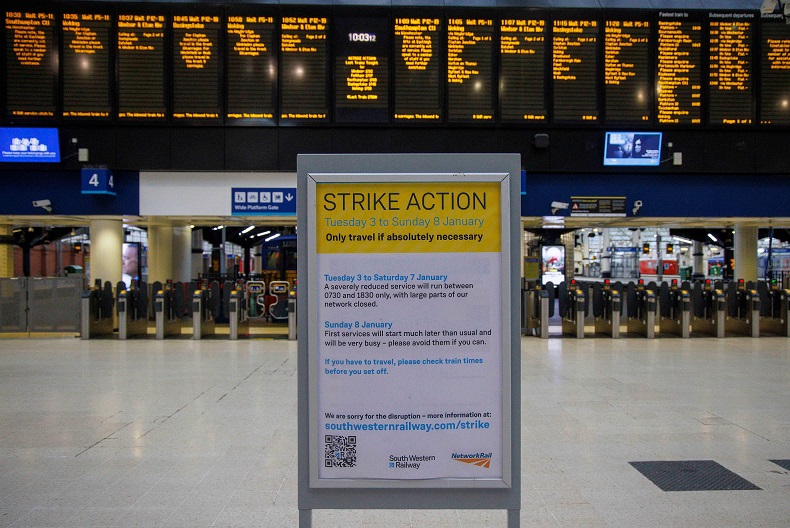Rishi Sunak's "Unworkable" Anti-Strike Laws Face "Quagmire" Of Legal Challenges And Lords Delays
Ministers have promised to limit strike disruption with tough new laws (Alamy)
4 min read
The government has confirmed plans for controversial anti-strike laws despite warnings from peers that plans "simply won't work" due to the likelihood of significant delays in Parliament and legal challenges from unions.
In an announcement on Thursday, ministers confirmed fire and ambulance services would be added to sectors subject to mandatory minimum service rules, which currently includes police and armed forces. Health services, education, border security and other transport services will be asked to take part in consultations with ministers to reach agreement around minimum provision levels.
Announcing the measures, Business Secretary Grant Shapps said minimum service levels would be imposed on those who fail to come to an agreement with ministers in the coming weeks.
"As well as protecting the freedom to strike, the Government must also protect life and livelihoods," he said.
"While we hope that voluntary agreements can continue to be made in most cases, introducing minimum safety levels – the minimum levels of service we expect to be provided – will restore the balance between those seeking to strike and protecting the public from disproportionate disruption."
The government also confirmed plans to allow employers to bring injunctions or seek damages from the strikes if that unions failed to follow the minimum provision rules.
Speaking on Monday, Prime Minister Rishi Sunak claimed a wave of winter strikes were causing "completely undue disruption".
PoliticsHome understands the new legislation could be put before MPs immediately when they return to Parliament on 9 January.
Ministers also said they were offering a further opportunity to have "honest, constructive conversations" with unions ahead of the new laws being passed in a bid to stave of strikes in the coming weeks.
But the controversial legislation is likely to face significant challenges when it goes to the House of Lords for scrutiny with long delays and a wave of amendments expected to be made to the new rules.
"This looks like another attempt by the Conservatives to distract from their appalling mismanagement of the economy and from their failure to avert strikes in the first place," Lord Fox, the Liberal Democrat spokesperson for Business, Energy and Industrial Strategy in the Lords, told PoliticsHome.
 "We'll be carefully scrutinising this legislation. But from what the government is saying our concern is this simply won't work."
"We'll be carefully scrutinising this legislation. But from what the government is saying our concern is this simply won't work."
A Labour source told PoliticsHome they were still waiting to see finer details of the bill before deciding which areas of the legislation to target, but anticipated a strong possibility of amendments.
"Peers of all parties and none will be gearing up to scrutinise the bill, and where necessary seek changes or press amendments," they said.
One civil service source told PoliticsHome that alongside extensive challenges by peers, they expected the legislation would be "bogged down in a quagmire" of legal challenges by unions, which would also cause severe delays.
"What is clear is [strike laws] will not have an easy journey through Parliament, and Sunak is not going to be able to bulldoze this through."
Further strikes are expected by rail unions, ambulance drivers and some civil servants in the coming weeks, with more likely to be announced as negotiations continue to stall.
Ministers continue to insist they have an "open door" for union leaders to discuss the impasse, but will not engage in formal negotiations around pay, the issue at the core of strikes.
But responding to the proposals, Labour's deputy leader Angela Rayner said they were "insulting to key workers" involved in industrial disputes.
"These proposals are unworkable and unserious from a dead-end Government. It's insulting to key workers that Rishi Sunak thinks that threatening teachers and nurses with the sack will end strikes," she said.
"At every stage the Government has sought to collapse talks and throw in last minute spanners. Now the Prime Minister is wasting time on shoddy hurdles that even his own Transport Secretary admits won't work.
She added: "Labour is united against this attack on fundamental British freedoms. We will oppose this bill and repeal these restrictions on the right to strike."
A number of Conservative MPs have already told PoliticsHome they believe it is unlikely that minimum service levels could be introduced before the next general election because implementing the rules would be too complex.
Speaking last month, one Tory MP said they believed the new rules could only have a "medium to long-term impact" anyway as they felt it was unlikely they would be brought into force ahead of a predicted general election in May 2024.
They explained that the tougher strike rules would take at least six months to implement after passing through Parliament because of their complexity, and felt they had "no choice" over going to the polls by Spring 2024.
"You cannot implement this in such a short period of time before the election," they said.
